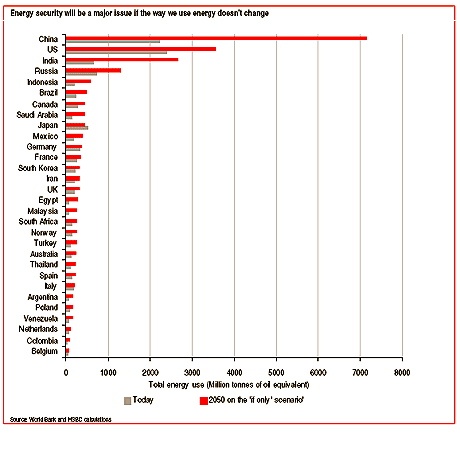
As critical in predicting the largest economies by 2050, will be understanding why such may eventually come to be or not. Predicting a significant shift toward the developing world, commodity rich countries and generally south from north, HSBC Bank has come up with its list, (below) of projected biggest economies by 2050. Even if the prediction eventually proves more accurate than not, the real question for today is what will reinforce or derail such trend.
Democracy & Open Societies Most Essential Ingredient to Sustainability, (even more so looking forward than back in history):
The HSBC Report appears to track more quantitative considerations, from population growth and resources, rather than the more subjective considerations associated with innovation, productivity and social peace. Democracy and free societies are ultimately the most essential to longer-term economic sustainability. That is a challenge most notably yet to be answered by China. Low labor costs and large populations can be impetus for a manufacturing advantage. However, free and open thinking societies are essential for innovation of what the world will consume and need in the next 4 decades rather than just next few years. We probably cannot envision the economic drivers in 4 decades just as most could not foresee Apple or Genentech (founded 1976 and bought by Swiss/global pharmaceutical Roche) or even the domination of Wallmart.
Deviancy Over Conformism?
A recently expressed concern regarding China’s future prospects is that the society has traditionally encouraged conformism. According to a Beijing professor mandated on the subject, deviancy, or at least willingness to challenge establishment way of doing things, is a critical ingredient to creativity and thus future economic innovation and success.
Some of the below projections are most dependent on growing population/production mass and availability of commodity resources. The study correctly notes the potential impact of climate change in altering the forecast. Other potential game changers include energy availability, (See Above Chart), barriers to population movements and wars. Population size plays an important role, and it does not in my opinion give adequate weight to the need to raise quality of life as well as education opportunities in order to recognize overall productivity. There are two other “measures” of economic potential that should be given greater weight:
“Human Development Index Rankings – UN” -
diplomaticallyincorrect.org/films/blog_post/human-development-index-rankings-un-by-ambassador-mo/39306
“Connectedness Translates to Prosperity” -
diplomaticallyincorrect.org/films/blog_post/connectedness-translates-to-prosperity-by-ambassador-mo/41754
A Developing Appetite for Freedom & Democracy Fueled by Exchange and Notion of Global Citizen:
While it may be difficult to anticipate the overall development of societies toward human rights, democracy and freedom/openness, it is an irreversible appetite of all peoples empowered and informed by the notion that all are global citizens. (This trend is in significant part driven by exploding opportunities for communication including the Web), For a country to be economically sustainable, it will have to answer such appetite/demands even if the menu may change from society to society.
"International Financial Crisis” Channel -
diplomaticallyincorrect.org/c/international-financial-crisis
By Ambassador Muhamed Sacirbey
Facebook Become a Fan at “Diplomatically Incorrect”
Twitter – Follow at DiplomaticallyX
HSBC’s Top 30 for 2050:
(1) China (+2)
2) U.S. (-1)
3) India (+5)
4) Japan (-2)
5) Germany (-1)
6) UK (-1)
7) Brazil (+2)
8) Mexico (+5)
9) France (-3)
10) Canada (same)
11) Italy (-4)
12) Turkey (+6)
13) S. Korea (-2)
14) Spain (-2)
15) Russia (+2)
16) Philippines (+27)
17) Indonesia (+4)
18) Australia (-2)
19) Argentina (2)
20) Egypt (+15)
21) Malaysia (+17)
22) Saudi Arabia (+1)
23) Thailand (+6)
24) Netherlands (-9)
25) Poland (-1)
26) Peru (+20)
27) Iran (+7)
28) Colombia (+12
29) Switzerland (-9)
30) Pakistan (+14)

